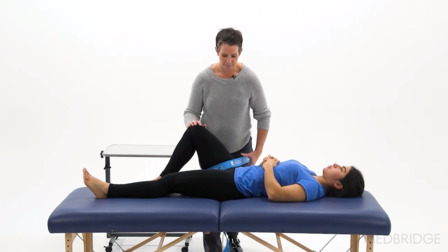Evidence-Based Examination of the SIJ/Pelvis
Presented by Alexis Wright
12-Month Subscription
Unlimited access to:
- Thousands of CE Courses
- Patient Education
- Home Exercise Program
- And more
In this course, users will evaluate the impact and prevalence of SIJ and pelvic dysfunction, understand the imperative patient history elements of a SIJ/pelvis examination, and identify which patient history components are affiliated with SIJ/pelvis pathology. The most common forms of self-report outcomes measures for the SIJ/pelvis are presented and discussed. Viewers will also identify the most prevalent red flags germane to the SIJ/pelvis examination, and differentiate the purposes of each diagnostic test for sinister problems. An objective is to synthesize the importance of specific, meaningful clinical findings during the examination process and evaluate the benefit of palpation and manual muscle testing as part of a dedicated clinical examination. Lastly, viewers will identify the most diagnostic SIJ/pelvis-oriented special tests and apply the tests to the appropriate diagnoses. Current research is presented throughout the course to provide learners with the proper tools for evidence-based management of these patients. This course is part of a comprehensive clinical series covering examination and intervention for the cervical, thoracic, and lumbar spine, as well as the upper (shoulder, elbow, wrist, and hand) and lower (hip, pelvis, knee, foot, and ankle) quarters.
Meet your instructor

Alexis Wright
Alexis A. Wright serves as professor and program director for the Tufts DPT Boston program. Wright has been invested in DPT education since 2011. She was recognized as a fellow of the American Academy of Orthopaedic Manual Physical Therapists in 2011 and achieved APTA board-certified orthopedic specialization in 2015. Wright…
Chapters & learning objectives

1. Sacroiliac Joint Dysfunction: Prevalence, Incidence, and Etiology
In this chapter, learners will evaluate the economic impact of SIJ/pelvic dysfunction and consider the prevalence/incidence of SIJ/pelvic pain and how this influences clinical practice. The overall burden of SIJ/pelvic pain is discussed in comparison to other musculoskeletal and nonmusculoskeletal conditions worldwide.

2. Patient History and Outcomes Measures
In this chapter, learners will discuss the imperative patient history elements of a SIJ/pelvis examination and define which patient history components are affiliated with SIJ/pelvis pathology. Learners will also discuss the most common forms of self-report patient outcomes measures, as well as their validity.

3. Observation
In this chapter, learners will identify the link between observation of posture and SIJ/pelvic pain or dysfunction. Learners will also identify benefits of general observation of a patient’s expression of fear, anxiety, or distress.

4. Triage and Screening
In this chapter, learners will identify the most prevalent red flags germane to the SIJ/pelvis examination. The chapter will compare and contrast the purposes of each diagnostic test for sinister problems. Learners will also analyze the triggers that would prompt the use of a test for ruling out a condition and evaluate the benefit of performing these “ruling out” actions first within the examination. Lastly, learners will understand structural differentiation.

5. The Movement Examination
This chapter will synthesize the importance of the movement assessment and will contrast the goals of the three primary phases of the initial examination.

6. Palpation, Muscle Testing, and Physical Performance Measures
This chapter will evaluate the benefit of palpation as part of a dedicated clinical examination and discuss the benefit and types of manual muscle testing for the pelvis/SIJ.

7. Special Tests
In this chapter, learners will understand the language of diagnostic accuracy and will identify the most diagnostic SIJ/pelvis-oriented special tests. The purpose of the chapter is to apply the tests to the appropriate diagnoses for better patient management.
More courses in this series

Crucial Factors Influencing Health & Recovery in Musculoskeletal Care
Chad Cook

Evidence-Based Examination of the Cervical Spine: An Update
Chad Cook

Evidence-Based Treatment of the Cervical Spine: An Update
Chad Cook

Cervical Spine Examination and Treatment: Cases to Synthesize Learning
Chad Cook

Evidence-Based Examination of the Thoracic Spine: An Update
Chad Cook

Evidence-Based Treatment of the Thoracic Spine: An Update
Chad Cook

Thoracic Spine Examination and Treatment: Cases to Synthesize Learning
Chad Cook

Evidence-Based Examination of the Lumbar Spine: An Update
Chad Cook

Evidence-Based Treatment of the Lumbar Spine: An Update
Chad Cook

Lumbar Spine Examination and Treatment: Cases to Synthesize Learning
Chad Cook

Evidence-Based Examination of the Elbow, Wrist, and Hand: An Update
Chad Cook

Evidence-Based Treatment of the Elbow, Wrist, and Hand: An Update
Chad Cook

Elbow, Wrist, and Hand Examination and Treatment: Cases to Synthesize Learning
Chad Cook

A Primer on Exercise and Treatment Prescription
Alexis Wright

Evidence-Based Examination of the Hip: An Update
Alexis Wright

Evidence-Based Treatment of the Hip: An Update
Alexis Wright

Hip Examination and Treatment: Cases to Synthesize Learning
Alexis Wright

Evidence-Based Examination of the Foot and Ankle: An Update
Alexis Wright

Evidence-Based Treatment of the Foot and Ankle: An Update
Alexis Wright

Foot and Ankle Examination and Treatment: Cases to Synthesize Learning
Alexis Wright

Evidence-Based Examination of the SIJ/Pelvis
Alexis Wright

Evidence-Based Treatment of the SIJ/Pelvis
Alexis Wright

A Primer on Examination and Treatment Metrics
Eric Hegedus

Evidence-Based Examination of the Shoulder: An Update
Eric Hegedus

Special Tests of the Shoulder
Eric Hegedus

Evidence-Based Treatment of the Shoulder: An Update
Eric Hegedus

Management of the Shoulder: Case-Based Vignettes
Eric Hegedus

Evidence-Based Examination of the Knee and Thigh: An Update
Eric Hegedus

Special Tests of the Knee
Eric Hegedus

Evidence-Based Treatment of the Knee and Thigh: An Update
Eric Hegedus

Management of the Knee and Thigh: Case-Based Vignettes
Eric Hegedus